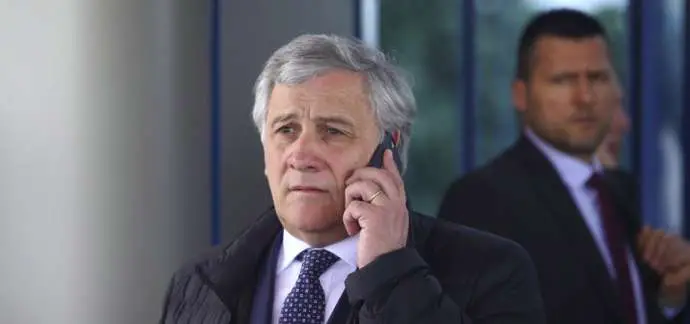STA, 12 February 2019 - Slovenian MEPs belonging to the European People's Party (EPP) share the concerns over Sunday's WWII aftermath statements by European Parliament President Antonio Tajani, but all except New Slovenia's (NSi) Lojze Peterle accepted the Italian's apology. Foreign Minister Miro Cerar will meanwhile ask Tajani for additional explanations.
Related: Slovenian Officials Criticise Italian "Revisionism" Over Foibe Massacres
Democrats (SDS) MEPs Patricija Šulin, Romana Tomc in Milan Zver wrote they accepted Tajani's explanation that his statements at the ceremony commemorating ethnic Italians killed by Yugoslav Partisans after WWII should definitely not be understood as nationalistic.
Commenting on Tajani's call "Long live Trieste, long live the Italian Istria, long live the Italian Dalmatia", the trio referenced the response of SDS leader Janez Janša, who said that Istria is Italian to the same extent as the Friuli-Venezia Giulia region is Slovenian.
Focusing on the part of Tajani's statement that undermined Slovenia's and Croatia's territorial integrity, Tomc added for the STA that "such reckless statements introduce unnecessary disquiet, especially since this chapter of history between Italy and Slovenia is closed".
While Tajani said in his apology that he had merely wanted to convey a message of peace, Tomc expects additional explanations and an open conversation also at the level of the EPP.
Related: President Pahor & Speaker Židan Express Concern After Neo-Fascist Rally in Trieste (Video)
At the same time she condemned what she labelled "a very populist reaction" to Tajani's speech.
Franc Bogovič of the Slovenian People's Party (SLS) also said phrases like Italian Istria and Dalmatia were completely unacceptable, with the memory still being alive of the horrors of the Fascist regime in occupied territories in Slovenia and Croatia after WWI.
Bogovič, however, also accepted Tajani's apology, leaving Peterle, Slovenia's first prime minister, as the only one to reject it.
"Neither his speech nor his half-hearted apology can be seen as contributing to peace," Peterle wrote, arguing Tajani did not apologise for his words but for their interpretation.
The NSi joined calls for Tajani's resignation.
Cerar is also disappointed
Meanwhile, also unhappy with Tajani's apology is Slovenian Foreign Minister Miro Cerar, who wrote to Tajani to remind him that European institutions and the European Parliament president had the duty to protect European values and not encourage this type of discourse.
Cerar, who is the head of the ALDE-affiliated Modern Centre Party (SMC), said the apology fell short of what he and Slovenia expect and that "it is fair that this matter be clarified fully".
"While every apology is welcome, it needs to be very clear that it involves the recognition of a mistake and the pledge the mistake will not repeat," Cerar said.
In the letter, Cerar said Tajani's statements had not reflected the spirit of the EU or its founding values.
"On the contrary, your statements are taking us back to times when dangerous rhetoric was used in Europe to encourage hatred towards other nations and create tensions."
"Many of us understood your statements as a threat, which is why we expect a sincere apology. The explanation regarding the alleged misinterpretation of you statements unfortunately does not suffice, since the statements run contrary to the basic principles of European order as laid down in the Helsinki Final Act on security and cooperation in Europe," Cerar wrote.
Cerar expects the leaders of European institutions to clearly say no to revisionism, to incitement of intolerance and hatred among nations.
"The tragic events of our shared history should not be the subject of political reinterpretations," the foreign minister added.
Cerar forwarded to Tajani a copy of a 2000 report by a bilateral commission of historians who examined Slovenian-Italian relations in the 1880-1956 period.
No apology from Salvini
While Tajani issued what has been described as a non-apology, Italy's Interior Minister Matteo Salvini has doubled down on statements he made at the ceremony and later on Twitter.
He said he did not understand the reaction of Slovenian Prime Minister Marjan Šarec, who spoke of "unparalleled revisionism" and wrote that "Fascism was a fact and its goal was to destroy the Slovenian nation".
"I don't believe that a child killed by the hands of a Nazi is any different than a child killed by the hands of a communist," Salvini said on Monday evening for an Italian TV report.







